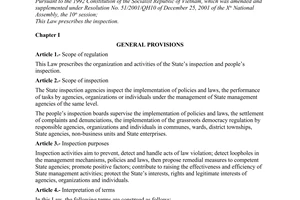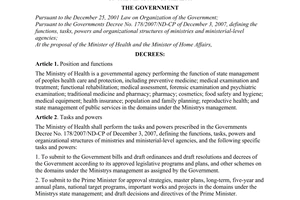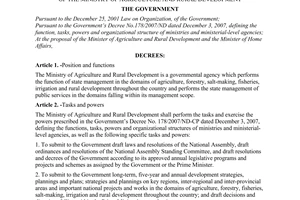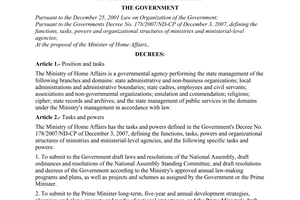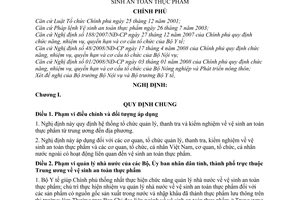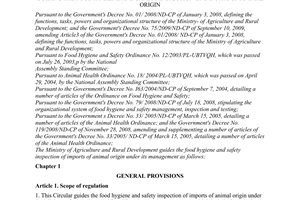Nội dung toàn văn Decree of Government No. 79/2008/ND-CP of July 18, 2008, on the organizational system of management, inspection and assessment of food safety and hygiene
|
THE
GOVERNMENT |
SOCIALIST
REPUBLIC OF VIET NAM |
|
No. 79/2008/ND-CP |
Hanoi, July 18, 2008 |
DECREE
ON THE ORGANIZATIONAL SYSTEM OF MANAGEMENT, INSPECTION AND ASSESSMENT OF FOOD SAFETY AND HYGIENE
THE GOVERNMENT
Pursuant to the December 25,
2001 Law on Organization of the Government;
Pursuant to the July 26, 2003 Ordinance on Food Safety and Hygiene;
Pursuant to the Government’s Decree No. 188/2007/ND-CP of December 27, 2007,
defining the functions, tasks, powers and organizational structure of the
Ministry of Health;
Pursuant to the Government’s Decree No. 48/2008/ND-CP of April 17, 2008,
defining the functions, tasks, powers and organizational structure of the
Ministry of Home Affairs;
Pursuant to the Government’s Decree No. 01/2008/ND-CP of January 3, 2008,
defining the functions, tasks, powers and organizational structure of the
Ministry of Agriculture and Rural Development;
At the proposal of die Minister of Home Affairs and the Minister of Health,
DECREES:
Chapter I
GENERAL PROVISIONS
Article 1. Scope of regulation and subjects of application
1. This Decree provides for the organizational system of management, inspection and assessment of food safety and hygiene from central to local levels.
2. This Decree applies to food safety and hygiene management, inspection and assessment agencies and organizations as well as Vietnamese and foreign agencies, organizations and individuals engaged in activities related to food. safety and hygiene.
Article 2. Scope of state management of food safety and hygiene of ministries and People’s Committees of provinces and centrally run cities
1. The Ministry of Health shall assist the Government in performing the uniform state management of food safety and hygiene; assume the prime responsibility for performing the food safety and hygiene state management of domestic and imported food products circulated on the market; act as the standing member of ;he inter-branch steering committee for food safety and hygiene at the central level and the ‘Vietnam Codex Alimentarius Commission.
2. The Ministry of Agriculture and Rural Development shall assume the prime responsibility for performing the food safety and hygiene state management of agricultural, forest and aquatic produce and salt throughout the course of food production from plantation, raising, harvest, fishing, slaughtering, preliminary processing, processing, packing, preservation and transportation to domestic sale or export; and the safety and hygiene state management of the import, temporary import for re-export, temporary export for re-import, border-gate transfer, transit, or transportation through the Vietnamese territory of, animals, plants and raw materials for raising, plantation and processing.
3. The Ministry of Industry and Trade shall assume the prime responsibility for performing the food safety and hygiene state management of food processing establishments under its management throughout the course of their production from the import of raw materials for processing, packing, preservation and transportation to domestic sale or export.
4. The Ministry of Science and Technology shall evaluate and announce national standards on food, safety and hygiene, evaluate national technical regulations on food safety and hygiene for promulgation by line management ministries; and participate in the assessment of food safety and hygiene.
5. The Ministry of Natural Resources and Environment shall perform the environmental protection state management of food production and trading.
6. People’s Committees of provinces and centrally run cities (below collectively referred to as provincial-level People’s Committees) shall perform the state management of food safety and hygiene in their localities according to law and the decentralization mechanism.
Chapter 2
ORGANIZATIONAL SYSTEM OF FOOD SAFETY AND HYGIENE MANAGEMENT
Article 3. Central state management agencies of food safety and hygiene
1. The Ministry of Health’s Food Safety and Hygiene Department shall advise and assist the Minister of Health in the state management, law enforcement and inspection of food safety and hygiene nationwide within the Ministry’s state management scope specified in Clause 1, Article 2 of this Decree and as assigned by the Ministry.
2. The Agricultural, Forest and Aquatic Product Quality Control Department shall assume the prime responsibility for, and coordinate with concerned units of the Ministry of Agriculture and Rural Development in, advising and assisting the Minister of Agriculture and Rural Development in the state management, law enforcement and inspection of food safety and hygiene nationwide within the Ministry’s state management scope specified in Clause 2, Article 2 of this Decree and as assigned by the Ministry.
3. The Ministry of Industry and Trade’s Science and Technology Department shall advise and assist the Minister of Industry and Trade in performing the state management of food safety and hygiene nationwide within the Ministry’s state management scope specified in Clause 3, Article 2 of this Decree and as assigned by the Ministry.
4. The Ministry of Science and Technology’s Directorate for Standards and Quality shall advise and assist the Minister of Science and Technology in performing the Ministry’s tasks nationwide within the Ministry’s state management scope specified in Clause 4, Article 2 of this Decree and as assigned by the Ministry.
5. The Ministry of Natural Resources and Environment’s Environment Administration shall advise and assist the Minister of Natural Resources and Environment in performing the state management of environmental protection related to food production and trading nationwide within the Ministry’s state management scope specified in Clause 5, Article 2 of this Decree and as assigned by the Ministry.
Article 4.- Agencies assisting provincial-level People’s Committees in the state management of food safety and hygiene
1.The Health Service:
a. To advise and assist the provincial-level People’s Committee in performing state management of food safety and hygiene in the provincial-level locality according to law and the decentralization mechanism: to act as the standing member of the provincial-level inter-branch steering committee for food safety and hygiene;
b. The Food Safety and Hygiene Sub-Department under the Health Service shall assist the Health Service director in implementing the law on, and conducting specialized inspection of, food safety and hygiene in the provincial-level locality.
The Food Safety and Hygiene Sub-Department is subject to professional guidance of the Ministry of Health’s Food Safety and Hygiene Department;
c. The provincial-level People’s Committee shall specify the functions, tasks, powers, organizational structure and payroll of the Food Safety and Hygiene Sub-Department under the guidance of its superior state agency.
2. The Agriculture and Rural Development Service:
a. To advise and assist the provincial-level People’s Committee in performing the food safety and hygiene state management of agriculture; forest, fisheries and salt production in the provincial-level locality according to law and the decentralization mechanism throughout the course of their production from the import of animals, plants, raw materials (used in raising, plantation and processing), raising, plantation, harvest, fishing, exploitation, slaughtering, processing, preservation and transportation to domestic sale or export of foods;
b. The Agricultural, Forest and Aquatic Product Quality Control Sub-Department or Section under the Agriculture and Rural Development Service shall assume the prime ‘responsibility for, and coordinate with concerned units under the Agriculture and Rural Development Service in, assisting the. Service director in implementing the law on, and conducting specialized inspection of food safety and hygiene in the provincial-level locality and is subject to professional guidance of relevant Departments of the Ministry of Agriculture and Rural Development;
c. The provincial-level People’s Committee shall specify the functions, tasks, powers, organizational structures and payrolls of the organizations specified at Point b of this Clause under the guidance of their superior state agencies.
3. The Industry and Trade Service shall advise and assist the provincial-level People’s Committee in performing the food safety and hygiene state management of local food processing establishments in the provincial-level locality according to law and the decentralization mechanism throughout the course of their production from the import of raw materials for processing, packing, preservation and transportation to domestic sale or export of products.
4. The Science and Technology Service:
a. To advise and assist the provincial-level People’s Committee in implementing national standards and technical regulations on food safety and hygiene in the provincial-level locality;
b. The Science and Technology Service’s Sub-Directorate for Standards and Quality shall assist the Service director in performing the task of food safety and hygiene in the provincial-level locality according to law and professional guidance of the Directorate for Standards and Quality.
5. The Natural Resources and Environment Service:
a. To advise and assist the provincial-level People’s Committee in taking environmental control measures in food production and trading in the provincial-level locality;
b. The Environmental Protection Sub-Department under the Natural Resources and Environment Service shall assist the Service director in conducting environmental control in food production and trading in the provincial-level locality according to law and professional guidance of the Environment Administration.
Article 5. Agencies assisting People’s Committees of rural and urban districts, towns and provincially run cities in the state management of food safety and hygiene
1. Health Sections under People’s Committees of rural and urban districts, towns and provincially run cities (below collectively referred to as district-level) shall advise and assist district-level People’s Committees in performing the state management of food safety and hygiene in district-level localities.
2. District Agriculture and Rural Development Sections and Economics Sections of districts, towns and provincially run cities shall advise and assist district-level People’s Committees in implementing regulations on food safety and hygiene in the course of raising, plantation, harvest, fishing, slaughtering, processing, preservation and transportation to the sale of foods in district-level localities.
3. Natural Resources and Environment Sections shall advise and assist district-level People’s Committees in taking environmental control measures in food production and trading in district-level localities.
Article 6. Tasks and powers of food safety and hygiene state management of People’s Committees of communes, wards and townships (below collectively referred to as commune-level)
1. To organize the implementation of food safety and hygiene plans and programs in commune-level localities under the direction of district-level People’s Committees.
2. To propagate, mobilize, examine and inspect the implementation of. the law on food safety and hygiene throughout the course of raising, plantation, slaughtering, processing, preservation, transportation, circulation and use of foods; and food hygiene on streets, in markets, tourist sites, eateries and restaurants, and during festivals in commune-level localities.
3. Commune-level health centers, veterinary workers, plant protection workers and holders of other related professional titles shall assist commune-level People’s Committees in performing the food safety and hygiene task in commune-level localities under the guidance of their superior state management agencies.
Chapter 3
ORGANIZATION OF FOOD SAFETY AND HYGIENE INSPECTORATE
Article 7. Food safety and hygiene inspectorate of the health sector
1. The food safety and hygiene inspectorate under the Food Safety and Hygiene Department (below referred to as the Department Inspectorate) shall assist the Department Director in performing the tasks and exercising the powers of administrative and specialized inspection of food safety and hygiene within the Ministry of Health’s state management scope.
2. Contents subject to specialized inspection of food safety and hygiene:
a. The satisfaction of standards and technical regulations on food safety and hygiene of domestic and imported foods circulated on the market;
b. The satisfaction of food safety and hygiene requirements of high risk foods, foods preserved by irradiation and limits of irradiative levels; food produced using gene technology: food additives, food processing elements and foods directly affecting human health:
c. The satisfaction of food safety and hygiene conditions for food processing, use and hygiene of restaurants, hotels, supermarkets, collective kitchens and street foods:
d. The observance of food safety and hygiene conditions of establishments producing and trading functional, nutritive-increased and supplementary foods, food additives; natural mineral water and cigarettes;
e. Contents of food and food additive advertisement;
f. Food safety and hygiene assessment.
3. Organization of the Department Inspectorate:
a. The Department Inspectorate has the Chief Inspector. Deputy Chief Inspectors and inspectors.
The Minister of Health may appoint, dismiss and relieve from office the Chief Inspector at the proposal of the Department Director after reaching agreement with the Chief Inspector of the Ministry. The Department Director may appoint, dismiss and relieve from office Deputy Chief Inspectors at the proposal of the Chief Inspector of the Department. The appointment and dismissal of inspectors comply with law;
b. Pursuant to the current law, the Minister of Health shall specify the organization, payroll and work relations of the Department Inspectorate; prescribe the mechanism, policy, uniform, badge, insignia signboard, forms and modes of inspection, and ensure technical means and equipment, for inspectors.
Article 8. Food safety and hygiene inspectorate in the agriculture and rural development sector.
1. The Agricultural, Forest and Aquatic Product Quality Control Department and a number of concerned departments of the Ministry of Agriculture and Rural Development may have their inspectorates (below referred to as the Department Inspectorates) to assist Department Directors in performing the tasks and powers of administrative and specialized inspection of food safety and hygiene within the Ministry’s state management scope as assigned by the Ministry of Agriculture and Rural Development to the Departments.
2. Contents subject to food safety and hygiene inspection in agriculture and rural development sector:
a. The application of food safety and hygiene control systems, including Good Manufacturing Practices (GMP), Good Aquaculture Practices (GAP), Code of Conduct (CoC), Good Hygiene Practices (GHP) and Hazard Analysis and Critical Control Point (HACCP), to production, processing and transportation, and other food safety and hygiene control systems;
b. Residues of antibiotics, toxic chemicals and agents causing diseases to animals and plants in agricultural, forest and aquatic products and salt before harvest and in preliminary processing, processing and transportation; control of animal slaughter and veterinary hygiene;
c. The satisfaction of technical norms on food quality and safety, epidemic safety and environmental safety in production, preservation and processing before circulation on the market;
d. The satisfaction of food safety and hygiene conditions of establishments and areas rearing aquatic products, and harvest, procuring, transporting, preserving, preliminarily processing and processing agricultural, forest and aquatic products and salt;
e. The pre-sale certification of food quality and safety for imported agricultural, forest and aquatic products and salt, domestic products for processing and export falling under the Ministry’s state management:
f. The grant of quarantine certificates to lots (of potential disease-carrying living animals or plant and animal products for breeding or processing) to be exported, imported, temporarily imported for re-export, temporarily exported for re-import, transited or regionally transferred, or to use the Vietnamese territory for transportation; the examination of the import or domestic production of animal feed, veterinary medicines, fertilizer, chemicals used in the raising and plantation of agricultural, forest and aquatic products and salt according to the decentralization mechanism.
3. Organization of a Department Inspectorate:
a. Department Inspectorate has the Chief Inspector, Deputy Chief Inspectors and inspectors.
The Minister of Agriculture and Rural Development may appoint, dismiss and relieve from office the Chief Inspector at the proposal of the Department Director after reaching agreement with the Chief Inspector of the Ministry. The Department Director may appoint, dismiss and relieve from office Deputy Chief Inspectors at the .proposal of the Chief Inspector of the Department. The appointment and dismissal of inspectors comply with law;
b. Pursuant to the current law, the Minister of Agriculture and Rural Development shall specify the organization, payroll and work relations of a Department Inspectorate; prescribe the mechanism, policy, uniform, badge, insignia, signboard, forms and modes of inspection, and ensure technical means and equipment, for inspectors.
Article 9. Tasks and powers of a Department Inspectorate
1. To participate in the formulation of legal documents on food safety and hygiene assurance and inspection, settlement of complaints and denunciations and anti-corruption work.
2. To scrutinize, and propose amendments to and supplementation of, food safety and hygiene regulations.
3. To inspect the observance of food safety and hygiene regulations.
4. To decide on administrative sanctioning in the domain of food safety and hygiene according to law.
5. To provide professional guidance and training in food safety and hygiene for food safety and hygiene inspectors at all levels: to propagate and disseminate the State’s legal documents related to food safety and hygiene assurance.
6. To receive citizens and prevent and fight corruption in the Department according to regulations.
7. To inspect other cases as assigned by the Department Director: to perform other tasks and exercise other powers according to law.
Article 10. Tasks and powers of a Department Chief Inspector
1. To lead and direct inspection operations under the Department’s state management.
2. To formulate inspection programs and plans, submit them to competent authorities for approval and organize their implementation.
3. To propose the Department Director to consider and suspend, or propose to a competent person to suspend illegal acts related to food safety and hygiene committed by agencies, organizations and individuals according to regulations when having sufficient grounds to determine that these acts cause damage to state interests, or lawful rights and interests of citizens, or obstruct inspection work.
4. To make inspection conclusions after having inspection reports of inspection delegations, and propose the Department Director to decide on post-inspection handling.
5. To assist the Department Director in monitoring, examining and urging the implementation of inspection conclusions, proposals and decisions of the Department Inspectorate and other related agencies.
6. To decide on administrative sanctioning in the domain of food safety and hygiene according to law.
7. To propose the Department Director to handle inspection-related matters. To report to the Ministry’s Chief Inspector on inspection operations, settlement of complaints and denunciations, and anti-corruption work within his/her scope of responsibility.
8 To perform other tasks and exercise other powers according to law.
Article 11. Inspectorates of Sub-Departments
1. Food Safely and, Hygiene Sub-Departments under Health Services may have their inspectorates to assist Sub-Department Directors in performing inspection tasks and powers within the ambit of the Sub-Departments’ tasks and powers.
2. Agricultural, Forest and Aquatic Product Control Sub-Departments and a number of concerned Sub-Departments under Agriculture and Rural Development Services may have their Inspectorates to assist Sub-Department Directors in performing inspection tasks and powers within the ambit of Sub-Departments’ tasks and powers. The Inspectorates of Agriculture and Rural Development Services that do not set up Sub-Departments shall conduct specialized inspection of food safety and hygiene.
3. The Inspectorate of a Sub-Department has the Chief Inspector, Deputy Chief Inspectors and inspectors. Holders of these titles are appointed and dismissed according to law.
4. The Inspectorate of a Sub-Department is subject to the Department Director’s direction and simultaneously to the direction and professional guidance of the Department Inspectorate and Service Inspectorate.
5. The Service Director may decide to establish the Inspectorate of a Sub-Department at the proposal of the Sub-Department Director after reaching agreement with the Chief Inspector of the Service.
Article 12. Tasks and powers of the Inspectorate of a Sub-Department
1. To inspect agencies, organizations and individuals in observing technical processes, regulations and norms, and food production and trading conditions under the Sub-Department’s state management domain.
2. To impose administrative sanctioning according to law.
3. To assist the Sub-Department Director in guiding and settling complaints and denunciations falling under the Sub-Department Director’s competence according to the law on complaints and denunciations; preventing and fighting corruption falling under the Sub-Department’s management.
4. To report on results of inspection, complaint and denunciation and settlement, and anti-corruption work falling under the Sub-Department’s management scope according to law.
5. To inspect other cases as assigned by the Service Director or Sub-Department Director.
Article 13. Tasks and powers of the Chief Inspector of a Sub-Department
1. To direct the inspection of food safety and hygiene under the Sub-Department’s management.
2. To formulate inspection plans, submit them to competent authorities for approval and organize their implementation.
3. To propose the Sub-Department Director for further proposal to the Service Director to decide on inspection when detecting signs of violation in the domain under the Sub-Department’s management.
4. To impose administrative sanctioning according to law.
5. To report to the Sub-Department Director and Service Director on inspection operations, complaint and denunciation settlement, and anti-corruption work within the ambit of his/her responsibility.
Article 14.- Inspectors
1. An inspector is a public
employee in a food safety and hygiene inspection agency who is
appointed to the inspector rank to conduct administrative and specialized
inspection. Public
employees having professional qualifications on food safety and hygiene who
have been trained in inspection work and meet prescribed criteria may be
appointed to be inspectors.
2. An inspector shall perform tasks and exercise powers specified in Articles 40 and 50 of the Inspection Law and other tasks and powers according to law.
3. An inspector may be recruited, appointed, dismissed and granted an inspector card and enjoy regimes and policies according to law.
4. In addition to general provisions on conditions and criteria on inspectors under the Inspection Law and the Government’s Decree No. 100/2007/ND-CP of June 13, 2007, on inspectors and inspection collaborators, an inspector must satisfy other conditions and criteria suitable to a branch and domain as prescribed by the Minister of Health or the Minister of Agriculture and Rural Development.
Article 15.- Inspection collaborators
1. An inspection collaborator is a person assigned to conduct inspection at the request of a Chief Inspector at any level or the head of a competent state agency.
2. An inspection collaborator must possess political qualities: be responsible, honest objective and fair; and have professional qualifications and skills suitable to the inspection assignment.
3. An inspection collaborator may enjoy regimes and policies specified in Article 19 of the Government’s Decree No. 100/2007/ND-CP of June 13, 2007, on inspectors and inspection collaborators, and other relevant legal documents.
Article 16. Pilot organization of food safety and hygiene inspectorates of district, and commune, ward and township levels
The Ministry of Home Affairs shall assume the prime responsibility for, and coordinate with the Ministry of Home Agriculture and Rural Development in, formulating and submitting to the Prime Minister in 2009 a draft decision on the pilot establishment of food safety and hygiene inspectorates of district, and commune, ward and township levels in Hanoi, Ho Chi Minh City and a number of other provinces and centrally run cities.
Chapter IV
ORGANLZATIONALSYSTEM OF FOOD SAFETY AND HYGIENE ASSESSMENT SAFETY
Article 17.- Organizational system of food safety and hygiene Assessment.
1. To establish the National Institute for Food Safety and Hygiene Assessment under the Ministry of Health in the basis of the Center for Food Safety and Hygiene Testing under the Nutrition Institute.
The National .Institute for Food Safety and Hygiene Assessment shall perform the arbitration task and evaluate the capacity of food safety and hygiene testing laboratories nationwide; assess the food safety and hygiene in the northern region; test complex and complicated norms which fall beyond technical capabilities of localities; train in. coach, direct and guide food safety and hygiene assessment techniques and evaluation of food safety and hygiene risks.
2. To establish regional centers for food safety and hygiene assessment nationwide, initially regional centers for food safety and hygiene assessment according to Point b, Clause 2, Section II of the Government’s action program to implement the Politbureau’s Resolution No. 46/NQ-TW of February 23, 2005, on the protection, care and improvement of people’s health in the new situation, promulgated together with the Prime Minister’s Decision No. 243/2005/QD-TTg of October 5, 2005.
3. Assessment centers and testing laboratories under the Ministry of Agriculture and Rural Development and the Ministry of Science and Technology shall conduct state examination and assessment of food safety and hygiene; provide assessment services for organizations and individuals within the Ministry’s management scope.
4. Testing laboratories of preventive health centers, assessment centers for pharmaceuticals, cosmetics and food safety and hygiene under Health Services, testing laboratories of district-level health centers, if fully meeting prescribed requirements, may conduct assessment in service of the state management of food safety and hygiene and provide assessment services for organizations and individuals.
5. Assessment centers and testing laboratories of scientific research institutes, universities, academies and colleges and private testing laboratories satisfying prescribed standards may provide food safety and hygiene assessment services for organizations and individuals.
Chapter V
RESPONSIBILITIES OF MINISTRIES, MINISTERIAL-LEVEL AGENCIES AND PROVINCIAL-LEVEL PEOPLE’S COMMITTEES
Article 18. Responsibilities of ministries
1. The Ministry of Health shall:
a. Propose the Prime Minister to decide on the establishment of the National Institute for Food Safety and Hygiene Assessment under Clause 1, Article 17 of this Decree;
b. Decide to establish according to its competence and define the functions, tasks, powers, organizational structures and payrolls of regional centers for food safety and hygiene assessment according to Clause 2, Article 17 of this Decree;
c. Provide professional guidance for Food Safety and Hygiene Sub-Departments under Health Services and cadres, public employees and servants of food safety and hygiene management, inspection and assessment;
d. Prescribe conditions on material foundations and equipment; criteria on cadres and servants of organizations permitted to provide food safety and hygiene assessment and testing services;
e. Coordinate with the Ministry of Finance and concerned agencies in working out a financial mechanism for the management, examination, inspection and assessment of food safety and hygiene for the Ministry of Finance to promulgate according to its competence, or submit to the Prime Minister for promulgation;
f. Assume the prime responsibility for, and coordinate with the Government Inspectorate and the Ministry of Home Affairs in, providing professional training in inspection work for cadres and public employees of food safety and hygiene management, examination and inspection organizations nationwide.
2. The Ministry of Agriculture and Rural Development shall:
a. Provide professional guidance for Sub-Departments or Sections of Agricultural, Forest and Aquatic Product Quality Control and a number of Sub-Departments related to food safety and hygiene under Agriculture and Rural Development Services, and cadres, public employees and servants of food safety and hygiene management, inspection and assessment.
b. Prescribe the management of assessment operation of testing organizations of the agriculture and rural development sector.
3. The Ministry of Industry and Trade shall:
a. Assume the prime responsibility for, and coordinate with the Ministry of Health in, guiding market management boards and enterprises in observing the law on food safety and hygiene in markets;
b. Guide and direct market control organizations at all levels in coordinating with specialized state management organizations in examining and inspecting the observance of the law on food safety and hygiene.
4. The Ministry of Science and Technology shall guide the Directorate for Standards and Quality in coordinating with specialized state management agencies in observing national standards and technical regulations on food safety and hygiene.
5. The Ministry of Natural Resources and Environment shall direct the Environment Administration in organizing the implementation of the law and policies on environmental protection in food production and trading.
6. The Ministry- of Finance shall:
a. Assume the prime responsibility for, and coordinate with the Ministry of Health and concerned ministries in, formulating and promulgating according to its competence or submitting to the Prime Minister for promulgation, the financial mechanism for the management, inspection, examination and assessment of food safety and hygiene;
b. Direct the General Department of Customs in coordinating with specialized state management organizations in complying with the law on food safety and hygiene for animals, plan, foods and food additives to be imported, exported, temporarily imported for re-export, temporarily exported for re-import or transited or to use Vietnamese territory for transportation.
7. The Government Inspectorate shall assume the prime responsibility for, and coordinate with the Ministry of Health in, guiding the uniform, badge, signboard, insignia, inspector card and the order of and procedures for appointing food safety and hygiene inspectors.
8. The Ministry of Home Affairs shall allocate food safety and hygiene administrative payrolls to ministries and provincial-level People’s Committees after being approved by the Prime Minister.
Article 19.- Responsibilities of provincial-level People’s Committees
1. To consolidate the organization of management, inspection and assessment of food safety and hygiene in the provincial-level locality according to this Decree.
2. To ensure payrolls for local organizations to perform the food safety and hygiene task.
3. To direct professional agencies of provincial-level People’s Committees and district- and commune-level People’s Committees in implementing this Decree and other relevant laws on food safety and hygiene falling under the local management.
Chapter VI
IMPLEMENTATION PROVISIONS
Article 20.- Implementation effect
1. This Decree takes effect 15 days after its publication in "CONG BAO."
2. To annul all previous provisions which are contrary to this Decree.
Article 21.- Implementation responsibilities
Ministers, heads of ministerial-level agencies, heads of government-attached agencies and presidents of provincial/municipal People’s Committees shall implement this Decree.
|
|
ON BEHALF OF THE
GOVERNMENT |

